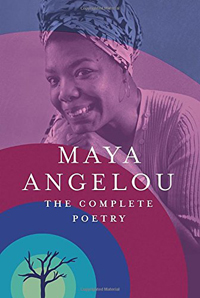 Maya Angelou, Maya Angelou; The Complete Poetry (New York: Random House, 2015), 308pp.
Maya Angelou, Maya Angelou; The Complete Poetry (New York: Random House, 2015), 308pp.
By the time Maya Angelou died in 2014 at the age of eighty-six, she had lived a remarkably rich life as an actress, singer, dancer, writer, director, producer, civil rights activist, and friend of the famous. She published thirty-eight books—including picture books, children's books, and cook books, but most people knew her from her seven autobiographies, especially I Know Why the Caged Bird Sings (1969).
Angelou published eleven books of poetry, which are collected here in a single volume, thus making it what the dust jacket calls "the definitive compendium" of her "complete poetry." Many of the poems exemplify the two themes for which Angelou was well known — growing up African American in the deep south (cf. "My Arkansas," "Momma Welfare Roll," or "Riot: 60's"), and celebrating womanhood ("Phenomenal Woman" or "Woman's Work").
At least two of the poems are specifically Christian — "Just Like Job" and "Thank You, Lord." But perhaps more importantly, beyond these three broad themes, Angelou tapped into the universal theme of being human, as in "Human Family." In that poem she affirms that despite our many and significant differences, "We are more alike, my friends, / than we are unalike."
I have only one complaint with this volume; it could have been so much better with a critical overview of Angelou's life and work, some sort of foreword or afterword to put these in context, but there's nothing at all along these lines. It's a conspicuous lacuna in an otherwise wonderful volume.


